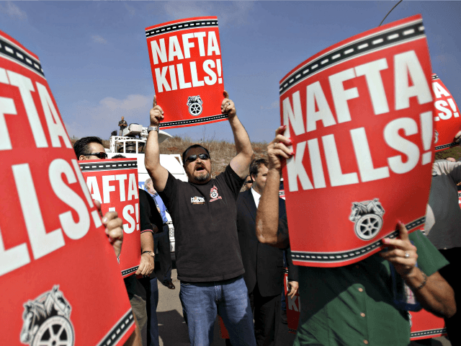
NEW ORLEANS—The AFL-CIO Executive Council announced March 14 that it will oppose any GOP Trump administration and corporate rush to enact a “new NAFTA” quickly in the 116th Congress.
In a detailed statement/position paper released at the end of the council’s meeting in New Orleans, the federation said “if the administration insists on a premature vote on the new NAFTA in its current form, we will have no choice but to oppose it.”
The statement and position paper came after the council discussed the trade pact, behind closed doors – as in all its sessions – with Jesse Seade, Undersecretary for Foreign Affairs in the new Mexican administration of President Andres Manuel Lopez Obrador.
Bill Samuel, the federation’s Director of Legislative Affairs, had forecast the decision in an interview with John Wojcik of the People’s World before the council met, but while labor leaders’ committees were preparing for the council sessions.
“We can’t support NAFTA in its current form,” said Samuel. “Protections for workers are better than they were before (under the old NAFTA) but the problem is that the new NAFTA does not set up mechanisms to enforce the protections. Another big problem is that the big pharmaceutical giants are free to do whatever they want. In its current form, it is a giveaway to them.”
Last year, GOP President Donald Trump strong-armed Mexico and Canada into accepting a “new NAFTA” to replace the 25-year-old trade pact which has cost between 700,000 and one million U.S. factory jobs, and thousands in services, such as call centers.
He must send the so-called “free trade” pact to Congress for up-or-down majority votes on legislation to implement the deal, not the “new NAFTA” itself. Under so-called “fast track” rules, Congress can’t change the legislation Trump sends them.
Trump railed against the current NAFTA on the 2016 campaign trail and it helped him win hundreds of thousands of popular votes from workers and their families in the Great Lakes states – Michigan, Ohio, Wisconsin and Pennsylvania – he narrowly carried. Those states’ electoral votes put him in the White House.
Democratic nominee Hillary Clinton waffled on NAFTA and when her husband, Bill, was president, he pushed the present NAFTA through Congress over strenuous worker opposition, led by the AFL-CIO. It accurately forecast the job losses as corporations decamped to Mexico to exploit its low wages, lax labor and environmental laws and its company-sponsored unions.
The council’s statement/position paper included the following key points:
* “Trade policy must be judged by whether it leads to a just, inclusive and sustainable economy…that works for all, regardless of race, gender or national origin and that in particular lifts up the most vulnerable.” NAFTA-prompted outsourcing, by contrast, means the current trade pact “has been a catastrophic failure.”
The current NAFTA created “a system of rigged trade, in which global firms could increase profits by transferring production to Mexico where they could take advantage of systemic worker repression, exploiting both U.S. and Mexican workers in the process,” the Executive Council declared.
* That can’t continue. “Economic justice cannot be achieved by continuing to give global firms free rein to abuse workers and exploit the environment in a race to the bottom disguised as ‘free trade.’ Nor can we allow trade agreements to be vehicles to achieve other corporate agendas that undermine the interests of working people and our families.”

* “By design, NAFTA distorted power relationships in favor of global employers over workers, weakened worker bargaining power and encouraged the de-industrialization of the U.S. economy.” And there was no enforcement of its side letter on “worker protections.”
Trump’s “new NAFTA” has worker protections written into its text – not a side letter – but those protections “repeat the same flaws” of worker protections in the current NAFTA, the statement/position paper says. And there’s still no enforcement.
The federation also said NAFTA has made it more difficult for workers to organize and bargain in all three countries: The U.S., Canada and Mexico.
* “As the current draft of the new NAFTA recognizes, Mexico must enact and fully and effectively implement reforms to its labor law to end the race to the bottom for workers in all three countries. This will require the upfront guarantee of sufficient resources for enforcement. This must happen before Congress takes up any new NAFTA deal.”
“The AFL-CIO commits to educating working people about what is happening in this process. And we commit to work with our brothers and sisters in Canada and Mexico and with the governments of all three countries to make the NAFTA renegotiation work for working people,” the statement says. The renegotiation has already finished.
“However, the current effort by the business community to pass the new NAFTA is premature, and if it continues, we will be forced to mobilize to defeat it, just as we mobilized to kill the Trans-Pacific Partnership.”











